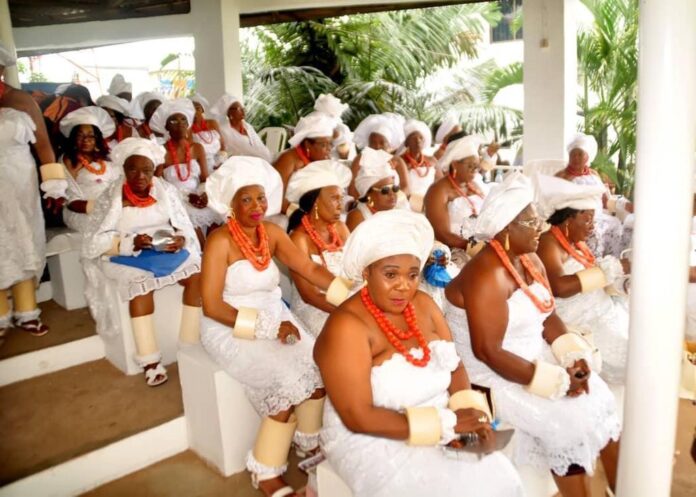The Otu Odu society has its roots in the Odu title taking tradition for women amongst the Oru/Olu of Onitsha. The Odu title is the most prestigious title for Onitsha women.
The women wore huge ivory bracelets and anklets. They also wore accessories similar to that of a male chief. They owned property and significant wealth.
The Odu title was popularized by the lively and culturally rich population of Onitsha.
Chief J. U Etukokwu the Odua Ngo of Onitsha and some women organized this group of titled women into an active guild; the popular Otu Odu Society in Onitsha.
Who can be members of the Otu Odu?
Otu Odu began as a private organization of Onitsha women of character and wealth. It has recently evolved into a prestigious society within modernized bylaws and functions that aim to guarantee the progress and peace of the Onitsha people with appropriate assistance from other subordinate groups.
There is no age restriction for Odu initiate. Minors under the age of 18 are, however, permitted to engage in Odu aka.
Otu Odu initiates are either indigenes, direct relatives from other groups (Nwadiani), or indigenes by marriage; the women must have distinguished themselves in their respective fields and been deemed worthy of great character.
There were no specific uniforms for Ndi Odu prior to the introduction of their white clothing. Etukokwu’s concept of wearing a white uniform to signify purity as Odu resulted in the introduction of the white uniform. The Elephant Tusk is also won gracefully.
However, depending on an individual’s financial capabilities, there are several levels or types of Odu. There are degrees to the Odu title. The highest level wears the Odu or ivory on both hands and ankles. On other days, they also wore metal ankle rings below the ivory.
Initiation Process
The initiation procedure begins with an initiate’s official declaration of purpose. This step enables the executives of Ndi Otu Odu to set up a fact-finding process. The fact-finding process is necessary as it helps to ascertain the eligibility of the initiate; which involves enquiries into the character, personality and integrity of the person.
Upon completion of enquiry; an intermediary who is an Odu Society member is then appointed as a mediator, and the transition continues.
A person’s Odu title is conferred through “Ikwo Aka Odu” initiation rituals. Initiation confers a specific name or title on the applicant, which henceforth appears before her name or surname.
However, every Odu titleholder is addressed “Iyom”. The ceremony is accompanied by the Okike or giant tusk and the Igba-Eze dance steps; this is also done during the burial of a member or any major occasion.
An Iyom is allowed to carry the Nza or horsetail, Akupe or ceremonial fan.
Otu Odu Specialities
The women that make up the Omu’s cabinet are selected from the members of the Otu Odu. When a member of the Otu Odu dies, she is given funeral rites similar to that of an Ozo titleholder; this is because cows and several goats are killed for her burial rites. She is also granted a prolonged burial ceremony befitting of a noble.
We must say the Onitsha kingdom has given the desired representation of those who value the contribution of women to society at large.
Literally, Odu means Elephant Tusk and in Onitsha tradition, Igbu Odu in clear terms means wearing of Tusk. At the initiation ceremony; Odu is to be worn either on the hands or the legs as a mark of status in the society.
Elephant Tusk is a symbol of beauty, wealth and regal. In most African cultures it is used to depict class and authority, especially in Onitsha.
Odu was considered a symbol of honour by a small number of women at the time of its inception; It was either given to them by a rich son or as a reward for their great business success.
Some key notes to highlight:
Ikwo aka Odu is the initiation rites to confer someone the Odu title.
Odu ukwu n’ aka is the complete procedure.
When taken for the hand, it is called Odu aka.
It is called Odu ukwu when undertaken for the legs.
